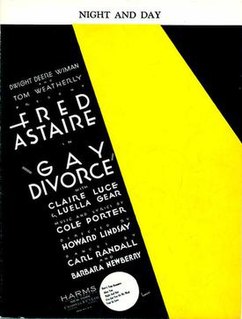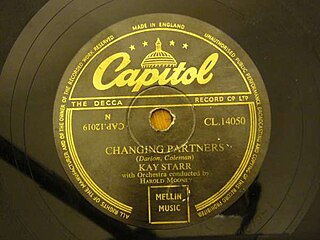
"That's All Right Mama" is a song written and originally performed by blues singer Arthur Crudup. It is best known as the debut single recorded and released by Elvis Presley. Presley's version was recorded on July 5, 1954, and released on July 19, 1954 with "Blue Moon of Kentucky" as the B-side. It was ranked number 113 on the 2010 Rolling Stone magazine list of the "500 Greatest Songs of All Time".
"If I Give My Heart to You" is a popular song written by Jimmy Brewster, Jimmie Crane, and Al Jacobs. The most popular versions of the song were recorded by Doris Day and by Denise Lor; both charted in 1954.
"The Little Shoemaker" is a popular song based on the French song, "Le petit cordonnier," by Rudi Revil. The original French lyric was written by Francis Lemarque. The English language lyrics were written by Geoffrey Claremont Parsons, Nathan Korb and John Turner.
"Little Things Mean a Lot" is a popular song written by Edith Lindeman (lyrics) and Carl Stutz (music), published in 1953. Lindeman was the leisure editor of the Richmond Times-Dispatch, and Stutz, a disc jockey from Richmond, Virginia. Stutz and Lindeman are also known for writing Perry Como's 1959 hit, "I Know".
"Hey There" is a show tune from the musical play The Pajama Game, written by Richard Adler and Jerry Ross. It was published in 1954. It was introduced by John Raitt in the original production. It was subsequently recorded by a number of artists. The recording by Rosemary Clooney reached #1 on Billboard's chart in 1954. Another version was also recorded about the same time by Sammy Davis Jr., reaching #16 on Billboard's retail chart. Another 1954 version by Johnnie Ray hit Billboard at #27. The song also reached #1 on the Cash Box chart in 1954.

"Mr. Sandman" is a popular song written by Pat Ballard which was published in 1954 and first recorded in May of that year by Vaughn Monroe & His Orchestra and later that same year by The Chordettes and The Four Aces. The song's lyrics convey a request to "Mr. Sandman" to "bring me a dream" – the traditional association with the folkloric figure, the sandman. The pronoun used to refer to the desired dream is often changed depending on the sex of the singer or group performing the song, as the original sheet music publication, which includes male and female versions of the lyrics, intended. The chord progression in each chorus follows the circle of fifths for six chords in a row. Emmylou Harris' recording of the song was a hit in multiple countries in 1981.
"Goodnite, Sweetheart, Goodnite" is a popular song that was a hit during the mid-1950s. It was written by Calvin Carter and James "Pookie" Hudson in 1951, and was first recorded by The Spaniels in 1953. It has also been released by some artists as "Goodnight, Well It's Time to Go".
"Let Me Go, Lover!", a popular song, was written by Jenny Lou Carson and Al Hill, a pseudonym used by Fred Wise, Kathleen Twomey, and Ben Weisman. It is based on an earlier song called "Let Me Go, Devil", about alcoholism.

"Night and Day" is a popular song by Cole Porter that was written for the 1932 musical Gay Divorce. It is perhaps Porter's most popular contribution to the Great American Songbook and has been recorded by dozens of musicians.

"Changing Partners" is a pop song with music by Larry Coleman and lyrics by Joe Darion, published in 1953. The best-known recording was made by Patti Page. It was also recorded the same year by Dinah Shore, Kay Starr and Bing Crosby.
"Sincerely" is a popular song written by Harvey Fuqua and Alan Freed and published in 1954.
"If " is a popular song with music written by Tolchard Evans and the lyrics written by Robert Hargreaves and Stanley J. Damerell. The song was written in 1934, but the most popular versions were recorded in 1950-1951. Perry Como's version, recorded November 28, 1950, was a #1 charted hit on the Billboard charts for 8 weeks. The Como version was released under the following labels and catalog numbers:
"The Naughty Lady of Shady Lane" is a popular song written by Sid Tepper and Roy C. Bennett. The lyrics suggest that this "naughty lady" driving the whole town crazy is an attractive young woman who "throws those come-hither glances at every Tom, Dick and Joe" and "when offered some liquid refreshment never says no"; but the last line reveals her to be an infant "nine days old".
"The Christmas Song" is a classic Christmas song written in 1945 by Robert Wells and Mel Tormé.
"Forever and Ever" is a popular song.

"The Way You Look Tonight" is a song from the film Swing Time that was performed by Fred Astaire and written by Dorothy Fields and Jerome Kern. It won the Academy Award for Best Original Song in 1936. Fields remarked, "The first time Jerry played that melody for me I went out and started to cry. The release absolutely killed me. I couldn't stop, it was so beautiful."
"(I Love You) for Sentimental Reasons" is a popular song written by Ivory "Deek" Watson, founding member of the Ink Spots, and William "Pat" Best, founding member of the Four Tunes.
"Such a Night" is a popular song from 1953, written by Lincoln Chase and first recorded by The Drifters.
"Make Love to Me" is the title of a 1954 popular song with words and music written by a larger team than normally is known to collaborate on a song: Bill Norvas, Alan Copeland, and the New Orleans Rhythm Kings, comprising Leon Rappolo, Paul Mares, Ben Pollack, George Brunies, Mel Stitzel, and Walter Melrose. The melody was derived from a 1923 song, "Tin Roof Blues", composed by the New Orleans Rhythm Kings.




